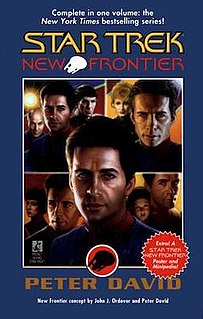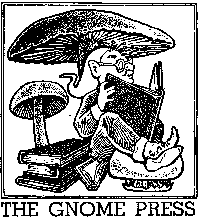
Edmond Moore Hamilton was an American writer of science fiction during the mid-twentieth century.

The Prisoner of Zenda is an 1894 adventure novel by Anthony Hope, in which the King of Ruritania is drugged on the eve of his coronation and thus is unable to attend the ceremony. Political forces within the realm are such that, in order for the king to retain the crown, his coronation must proceed. Fortuitously, an English gentleman on holiday in Ruritania who resembles the monarch is persuaded to act as his political decoy in an effort to save the unstable political situation of the interregnum.

Star Trek: New Frontier is a series of interlinked novels written by Peter David, published by Simon & Schuster imprints, Pocket Books, Pocket Star, and Gallery Books, from 1997 to 2015. New Frontier was the first Star Trek tie-in fiction property not to be based on a television series. The series was created by John J. Ordover.

Planetary romance is a subgenre of science fiction or science fantasy in which the bulk of the action consists of adventures on one or more exotic alien planets, characterized by distinctive physical and cultural backgrounds. Some planetary romances take place against the background of a future culture where travel between worlds by spaceship is commonplace; others, particularly the earliest examples of the genre, do not, and invoke flying carpets, astral projection, or other methods of getting between planets. In either case, it is the planetside adventures which are the focus of the story, not the mode of travel.

The Skylark of Space is a science fiction novel by American writer Edward E. "Doc" Smith, written between 1915 and 1921 while Smith was working on his doctorate. Though the original idea for the novel was Smith's, he co-wrote the first part of the novel with Lee Hawkins Garby, the wife of his college classmate and later neighbor Carl Garby. The novel starts as an edisonade, but turns into a space travel adventure when the characters go into deep space. The Skylark of Space is considered to be one of the earliest novels of interstellar travel and the first example of space opera. Originally serialized in 1928 in the magazine Amazing Stories, it was first published in book form in 1946 by the Buffalo Book Co. The novel was followed by three sequels, beginning with Skylark Three.
The Golden Duck Awards for Excellence in Children's Science Fiction were given annually from 1992 to 2017. The awards were presented every year at either Worldcon or the North American Science Fiction Convention (NASFiC). In 2018 they were replaced by Notable Book Lists of the same names sponsored by the Library and Information Technology Association (LITA).

Del Rey Books is a branch of Ballantine Books, which is owned by Random House and, in turn, by Penguin Random House. It is a separate imprint established in 1977 under the editorship of author Lester del Rey and his wife Judy-Lynn del Rey. It specializes in science fiction and fantasy books, and formerly manga under its Del Rey Manga imprint.

Gnome Press was an American small-press publishing company primarily known for publishing many science fiction classics. Gnome was one of the most eminent of the fan publishers of SF, producing 86 titles in its lifespan — many considered classic works of SF and Fantasy today. Gnome was important in the transitional period between Genre SF as a magazine phenomenon and its arrival in mass-market book publishing, but proved too underfunded to make the leap from fan-based publishing to the professional level. The company existed for just over a decade, ultimately failing due to inability to compete with major publishers who also started to publish science fiction. In its heyday, Gnome published many of the major SF authors, and in some cases, as with Robert E. Howard's Conan series and Isaac Asimov's Foundation series, was responsible for the manner in which their stories were collected into book form.

NESFA Press is the publishing arm of the New England Science Fiction Association, Inc. The NESFA Press primarily produces three types of books:

The planetary systems of stars other than the Sun and the Solar System are a staple element in much science fiction. Sirius, a double star system with the binary designation Sirius AB, is the brightest stellar object in the night sky. Its component stars are Sirius A and Sirius B.
The planetary systems of stars other than the Sun and the Solar System are a staple element in many works of the science fiction genre.

StarShipSofa is a science fiction podcast from the United Kingdom hosted by Tony C. Smith with Jeremy Szal as the fiction editor and producer, Gary Dowell as co-producer and Ralph M. Ambrose as the assistant editor. It was the first ever podcast to be both nominated for and to win a Hugo Award for Best Fanzine. StarShipSofa was also nominated for Best Fan Podcast in the 2007 Parsec Awards. StarShipSofa is free directly from the web site and is available for subscription and automatic download through iTunes.
The Road to Science Fiction is a series of science fiction anthologies edited by American science fiction author, scholar and editor James Gunn. Composed as a textbook set to teach the evolution of science fiction literature, the series is now available as mass market publications.
Michael Joseph Cassutt is an American television producer, screenwriter, and author. His notable TV work includes producing or writing, or both, for The Outer Limits, Eerie, Indiana, Beverly Hills, 90210, and The Twilight Zone. In addition to his work in television, Cassutt has written over thirty short stories, predominately in the genres of science fiction and fantasy. He has also published novels, including the 1986 The Star Country, the 1991 Dragon Season, the 2001 Red Moon and the 2011 Heaven's Shadow, in collaboration with David S. Goyer. In addition, Cassutt contributes non-fiction articles to magazines and is the author of the non-fiction book, The Astronaut Maker, a biography of NASA legend George W. S. Abbey (2018).
Phoenix Pick is the science fiction and fantasy imprint of Arc Manor Publishers based in Rockville, Maryland, United States.

Space opera is a subgenre of science fiction that emphasizes space warfare, melodramatic adventure, interplanetary battles, chivalric romance, and risk-taking. Set mainly or entirely in outer space, it usually involves conflict between opponents possessing advanced abilities, futuristic weapons, and other sophisticated technology. The term has no relation to music, as in a traditional opera, but is instead a play on the terms "soap opera", a melodramatic television series, and "horse opera", which was coined during the 1930s to indicate a clichéd and formulaic Western movie. Space operas emerged in the 1930s and continue to be produced in literature, film, comics, television, and video games.











